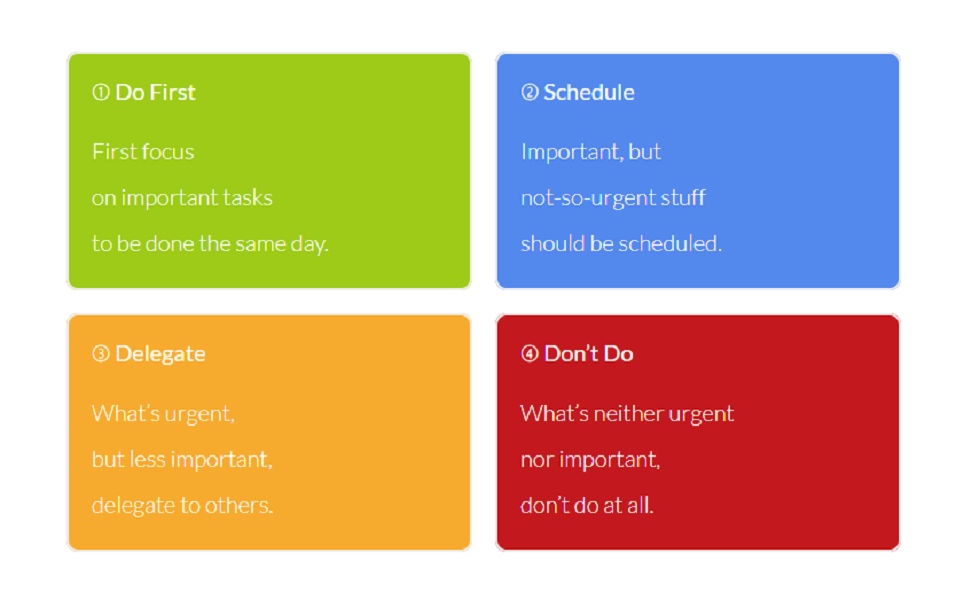“I have two kinds of problems, the urgent and the important. The urgent are not important, and the important are never urgent.”
Now this, I think, represents a dilemma of modern man. – President Eisenhower 1The American Presidency Project, Speech delivered by: Dwight D. Eisenhower, Speech number: 204, Title: Address at the Second Assembly of the World Council of Churches, Location: Evanston, Illinois, Date: August 19, 1954, Website description: The American Presidency Project was established in 1999 as a collaboration between John T. Woolley and Gerhard Peters at the University of California, Santa Barbara. Archives contain 104,855 documents related to the study of the Presidency. (Accessed presidency.ucsb.edu on May 8, 2014) link
The demands on the attention of a person living in the 21st century are immense. Phone calls, emails, social media. Notification spam overload. Family, friends, co-workers. Shows, music, games. And of course, ads ads ads.
The world is trying to splinter your attention. Break it apart in a thousand different directions. Attempting to pull and push you in bite-sized chunks that distract you from your purpose.
Squeeze a text in between paying attention at the meeting. Check Twitter while you’re playing with your kids. Reply to that partner’s email while your husband went to the bathroom at dinner.
Computers, smartphones, and the Internet have infected the modern person with a sense of perpetual urgency. Little red dots on your phone with a number on them, a ding from your computer speakers, push notifications on your lockscreen. And interwoven through all of it is FOMO – the fear of missing out.
- What if I miss an important email?
- What if I miss out on a text that’s an invitation to hangout?
- What if I miss a funny gif?
Companies that prey on your attention have conditioned you to think that they’re important and urgent – when likely they are neither.
Let Go Of FOMO
When I sit down at my computer in the morning, I know there are going to be a list of items calling for my attention. Unanswered emails, dozens of notifications on Twitter, a thousand messages in LawyerSmack. And that’s not even looking at the list of actual work that I need to accomplish.
The allure of all these different activities is strong, they’re designed to play on FOMO and drive you to sink further into feedback loops. And this infection can spread across your mind to work as well.
If you’re not careful you’ll find yourself in a constant state of reaction. Waiting for some ding, blip, or message telling you what to do. You’re a trained monkey pushing a button to get a banana.
You have to push back against these distraction and determine what is actually important and urgent, and what is just parasitic noise trying to steal your attention.
There are two methodologies that you need to adapt if you’re finding yourself frazzled and flailing about while continually reacting to things.
- Deep Work
- Eisenhower Matrix
Embrace Deep Work
Deep Work is a hypothesis from computer scientist Cal Newport. Newport posits:
Professional activities performed in a state of distraction-free concentration that push your cognitive capabilities to their limit. Their efforts create new value, improve your skill, and are hard to replicate.
The ability to perform deep work is becoming increasingly rare at exactly the same time it is becoming increasingly valuable in our economy. As a consequence, the few who cultivate this skill, and then make it the core of their working life, will thrive.
Newport offers 4 steps to embracing Deep Work:
- Rule # 1 Work Deeply – To perform deep work, you must remove distractions.
- Rule # 2 Embrace Boredom – “Instead of scheduling the occasional break from distraction so you can focus, you should instead schedule the occasional break from focus to give in to distraction.”
- Rule # 3 Quit Social Media – You don’t have to quit social media entirely. But you certainly shouldn’t be paying attention to it while you’re trying to work. Other interruptions too – your phone, email, etc. When you plan to engage in deep work, disengage from everything else.
- Rule # 4 Drain The Shallows – The shallow work that dominates the time of most knowledge workers is less vital than it often seems in the moment.
Once you’ve embraced the first three rules is when the Eisenhower Matrix comes into play – draining the shallows.
Use The Eisenhower Matrix To Drain The Shallows
The Eisenhower Matrix, also referred to as Urgent-Important Matrix, helps you decide on and prioritize tasks by urgency and importance, sorting out less urgent and important tasks which you should either delegate or not do at all.2http://www.eisenhower.me/eisenhower-matrix/
Here is a two minute video that lays out how to use the Eisenhower Matrix:
Divide tasks into these four quadrants.
- Urgent and important (tasks you will do immediately).
- Important, but not urgent (tasks you will schedule to do later).
- Urgent, but not important (tasks you will delegate to someone else or give low priority).
- Neither urgent nor important (tasks that you will eliminate).
Enjoy Your Superpower
Once you’ve set aside time for deep work and the discipline of prioritizing your tasks, you’ll find that you can accomplish more than you ever have before. Tasks that had previously piled up will instead line up to be knocked down like dominoes.
Setting aside time for deep work and prioritizing tasks will actually give you more time – because you’ll be getting things done at a much more rapid clip.
Finally, the quality of your work will improve. When you’re no longer attempting to focus on a dozen things at once and instead dedicating your attention and energy to deep work, you’re much more likely to produce something remarkable.
And why would you want to create anything less?
References














